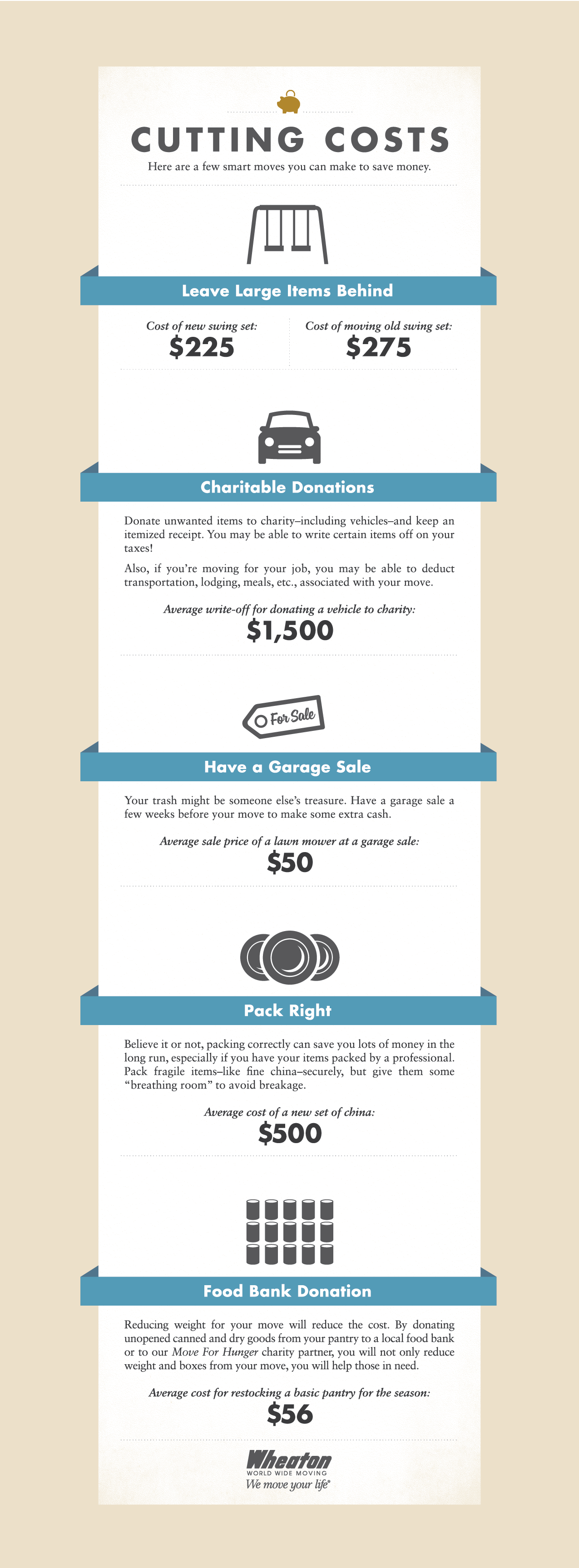Relocating is hard – saving money on your next move is easy
It doesn’t matter whether you’re moving into a five-story mansion or an apartment on the fifth floor, relocation comes with more than its share of expense. Extra costs are the last thing you need – on top of the stress and anxiety caused by moving. Wheaton wants to help ease the burden a bit by offering you tried-and-true suggestions for minimizing your moving costs.
The bottom line is simple: the more stuff you move, the more it’ll cost you. On long distance moves, the main cost factors are weight and distance, while local moves are calculated by handling time and added services, like packing.

Plan how to cut costs during your move through leaving large items behind, donating items to charity, or talking to a Wheaton agent.
Elimination rather than relocation
While you’re organizing or packing for your move, sift, sort and use a heavy hand toward the trash can. Let common sense and these tips be your guide. Follow this rule: Cleaning out the clutter.
The floor plan
If possible, get a floor plan of your future residence, or make one to scale on graph paper. Try to fit your furniture in the mock up. If it won’t fit on paper, it won’t fit when you arrive. Consider not moving it.
Color-coordinate your move
If the sofa just won’t match, you might want to leave it. Often you can replace furniture and appliances more cost-effectively than you can re-upholster and move them.
Ignore the “I-might-need-it-someday” syndrome
Don’t move the riding mower to an apartment. Part with tools you won’t have a place to use. And remember, junk is junk. You don’t need a furnished attic.
Book learning
Condense your library as much as possible and then investigate the cost of mailing treasured volumes compared to the cost of moving them. The special postage rate for books may save you money.
Plan for plants
Check with us. It is illegal to bring plants into many states. Even if it is possible, it may not be sensible. Click here for more information about what not to pack.
Dirt’s not dirt cheap
If you’re determined to take your huge outdoor planters, fill them with miscellaneous items instead of dirt. Same goes for the sandbox. There will be dirt and sand where you’re going.
The shirt off your back
While one dress or one suit doesn’t weigh much, the average full wardrobe carton weighs 75 pounds. So if you’re never going to wear it, don’t relocate it. Contact your local Goodwill agency and make a donation – there may be tax benefits.
The sound of money
Hundreds of CDs and DVDs can make for a heavy box. Burn your favorite songs to your computer and you’ll be able to keep the music without the bulk of the discs. Go through your DVD collection and eliminate DVDs you don’t watch anymore. Even sell your outdated CDs and DVDs for cash.
Toys – the kids’
Now’s the time to clean out the toy box. If the kids are old enough, give them incentive. Let them stage their own garage sale and keep the profits to buy something special – after you’ve moved. Read more tips on how to move with children.
Toys – yours
If your treadmill hasn’t gone a mile in years, moving it won’t help. Consider selling weight-lifting equipment and replacing it at your destination. Remember, weight equals cost. Sell any hobby equipment you no longer enjoy.
Food for thought
Frozen foods cannot be shipped, so eat up. Consume canned goods and food staples, and don’t replenish them. Plan menus to make the most of what you have, or donate non-perishable food to Move For Hunger. Be sure to empty your refrigerator completely and clean it thoroughly to prevent odor problems.
Handyman heavies
The workshop is a storehouse of bulky, heavy items. Evaluate them carefully – from the workbench to the tools. It might be advantageous to replace the massive workbench, etc.
Rugs
Unless they’re valuable, or you’re sure they’ll fit and flatter your new residence, get them out from underfoot.
The swing set
You’ll probably come out ahead with your finances, your kids and your back if you replace it rather than move it.
Firewood
Burn your firewood prior to your move. Sell or give remaining wood to friends or neighbors. Don’t move it, especially if your new home doesn’t have a fireplace.
Cue clues
A pool table requires special handling. Your best shot might be to sell it and then replace it at your new destination.
Musical notes
Pianos and organs also require special handling and should be tuned after a move. If they’re an enjoyable part of your lifestyle, move them. If they’re just impressive trimming, you might want to trim your moving cost.
Bah humbug
Be a Scrooge when it comes to special holiday decorations. Don’t move what you can’t or won’t use.
Don’t be fuelish
Do not under any conditions move flammable items. Empty fuel from the lawn mower, power tools and kerosene lamps. Don’t take paints (oil base), bleach, cleaning fluids, lighter fluids, matches, ammunition or any other type of combustible. Check the kids’ chemistry set. Butane tanks cannot be loaded into a moving van unless they are certified as being professionally purged. Check out more information about what not to pack. If you have doubts, don’t take it. Better safe than sorry.
Can your aerosol cans
A seemingly innocent aerosol can of hair spray could explode and endanger your whole shipment. Eliminate all aerosol cans – hair sprays, shaving creams, deodorants, household cleaners, insecticides, tarnish removers, car cleaners and others. Read more information about what not to pack.
Liquidate or donate
Once you decide what you’re going to part with, decide how. If you’re selling a home, the buyer may be your best customer. Some items that can often be advantageously sold with the home are listed in the next section. There are other ways to make a good riddance and a good profit in the process.
Have a garage sale
Organize it, advertise it and manage it. You’ll be amazed to see how profitably your trash can become someone else’s treasures.
Advertise in the classifieds or online
For more valuable items, post a classified ad in your local paper or online. Many websites offer free or low cost listings that can reach thousands of people. Including a photo of the item can enhance its value and exposure.
Donate to your favorite charity
Itemize each donation and keep a receipt. It may help you qualify for a tax deduction.
Sell it “as is”
Before you even put your residence up for sale, carefully consider extras that can be included to increase the appeal and the value of your home – and to cut moving costs. Discriminating buyers will probably want everything but your family portrait. Many extras add more value to the house than they actually cost in the first place. This is even true for apartment dwellers, who may find the future tenant a ready and willing buyer.
From chandeliers to ceiling fans
Most buyers assume that such fixtures are included with the home. Unless there’s a special sentimental reason, they probably should be. Bulky, fragile ceiling fixtures require special packing and handling which costs money.
Appliances
Consider the age, size and color of your appliances. These are very heavy items, and usually require professional servicing before the relocation and special installation upon moving in. So, if your stove, refrigerator, washer, dryer or freezer won’t fit or match in your new home, perhaps it’s time to start anew. Find out how to prepare appliances for a move here.
Don’t play with power
You can prevent wiring damage caused by temperature changes by unplugging all electronic items 24 hours before loading and waiting 24 hours at your new residence before plugging them into an outlet. Check to be sure that you have the proper power connections and sources for your appliances in your future residence. Don’t even consider moving a gas stove or dryer to an all-electric house.
Hearth and home
They go together. Special fireplace screens and tools are hard to move and may not fit where you’re going. Sell them with your home.
Shelving systems
If you have a built-in shelving system, leave it that way. No new owner will appreciate holes in the wall where the shelves used to be. And it probably won’t fit wherever you’re headed.
Satellite dishes
Be sure to check to see if the same cable company services your new city before you move your satellite dish. Use Wheaton’s Utility Connection Center to find services in your area.
From flag poles to basketball goals
We’ve been asked to move them before! But you’re better off selling them with the house and saving yourself time, trouble and money.
Arrange for the transfer of valuables
Start with the contents of your safe deposit box. Carry them with you or send by insured or registered mail: small valuables such as jewelry, insurance policies, legal documents, stocks and bonds, etc. Items of such unusual value should not be included in your shipment. The same is true for important computer discs and CDs which can warp and become unreadable.
Miscellaneous money, time and headache savers
Once you’ve organized your belongings, it’s time to organize your move. The things you don’t do can cost you both money and time. Here’s a listing of small details that can save you dollars and headaches.
Coordinate your move
It’s always best to start the process well in advance and, if possible, arrange occupancy dates in your new residence to avoid storage or delays.
Notify telephone, electric, gas and water companies
Set a specific date for service discontinuation on a specific date. Request a final meter reading. Don’t forget to connect utilities in your destination city prior to your arrival. Otherwise, you might have to stay at a hotel until they’re connected. Use Wheaton’s helpful Utility Connection Center to disconnect and reconnect many of your utilities.
Discontinue cable and local newspapers
You can use Wheaton’s Utility Connection Center to do these tasks as well.
Change your magazine subscription
Make sure to change the address on your magazine subscription in advance to ensure you don’t miss any issues.
Cancel
Shut down security company, lawn and any other type of regular service.
Check your bank and savings accounts
Arrange to transfer deposits so that you don’t lose interest. Use your bank as a credit reference.
Avoid going postal
Advise your Post Office, publications and correspondents in advance. This will prevent a delay in service.
Contact
Informing former employers and the Social Security Administration of your relocation will simplify obtaining future information for income tax purposes.
Collect any deposits
Whether it’s a landlord or a utility company, it’s easier to get deposits back in person than via long distance.
Check with orthodontist, obstetrician, etc.
If any members of your family require ongoing medical or dental treatment for which you have paid, arrange with the practitioner to pro-rate payments with a professional in your destination city.
Check your homeowners insurance
It may be possible to have it applied to your future residence, or reassigned to the future owners and pro-rate payments. If not, you may qualify for a partial refund. Be sure to coordinate insurance so that you’re covered in your new residence immediately.
If you sold it, don’t move it
Be on hand on moving day to make sure that anything which was supposed to stay with the home doesn’t go on the van. If these items are shipped, it’s going to cost time and money to send them back.
Membership fees
Depending on the clubs or organizations you belong to, you may be able to sell memberships or get a partial refund on dues.
Lockers and cleaners
Be sure to collect all your belongings in club or school lockers and at the dry cleaners.
Check on car or installment loans
You may be required to notify the lending company of your move.
Transfer all insurance records
Verify that your car insurance is adequate, as rates vary from city to city.
Close accounts
Close any revolving charge accounts with department stores or specialty shops that don’t have locations in your destination city.
Notify
Inform national credit or charge card organizations to change the address on your account.
Case closed
Try to complete closing and any other legal matters before you move. It’s costly to make a return trip to take care of details.
Arrange for payment of your driver
Unless charges are to be billed to your employer or the cost of moving has been charged to your personal credit card, payment by cash, certified check or money order is required at your destination.
The better the packing, the better the moving
Professional packing is an added expense, but it often pays for itself in convenience and safety. We have the expertise and materials to protect your possessions. Even if you have the time and energy to pack, consider leaving your delicate or fragile items (china, glassware, silver, clocks, etc.) for the professionals. If you’re a determined do-it-yourselfer, do it right. Ask your Wheaton Agent about specially designed containers and materials. You can buy them at a minimum cost to assure maximum protection of your belongings.
Don’t use newspaper for packing
Newsprint fades and the ink runs easily, possibly ruining the items it was supposed to protect. Learn more about moving supplies.
Pack toiletries separately
Ideally in small containers. Be sure corks and caps are secure.
Don’t pack too compactly
Give fragile items “breathing room” to avoid breakage. You can leave clothing in drawers, but remember – overstuffing can cause drawers to warp. For more tips, read about packing and unpacking.
Proper servicing of your appliances
Contact a professional or ask your local Wheaton agent to arrange service for you.
Right side of the bedding
Leave fitted sheets on mattresses to protect them.
Spread your linens around
Instead of putting them all in one carton, use your linens as fillers to cushion other items.
Heavy items on the bottom
Put heavy items on the bottom and then fill up with lighter things. Use smaller cartons for special items like books, cast-iron cookware, etc.
Electronic
Package stereo equipment and plasma televisions in original packaging, if possible, or have them serviced by professionals.
Label (and list)
Indicate contents on the outside of the carton. If possible, designate which room the carton should go in; it’ll simplify things at your destination. Be sure to indicate on the outside of the carton if the contents are especially fragile.
Unload first
Combine items you’ll need immediately upon arrival in one box. Designate it “Unload First.” Include necessities like toilet paper, paper towels, cups, a can opener, soap, etc.
Save on taxes
There are many small things that could save you big money on your taxes at the end of the year. Be sure to keep track of each of these items.
Charity case
When you donate items to charity, request and keep an itemized receipt.
It might help you qualify for a tax deduction.
Detailed records and receipts of moving expenses
Include transportation, lodging, meals, etc. If you are moving because of a change in principal place of employment, such reasonable expenses are deductible. Check with the Internal Revenue Service or your accountant for specifics.
Record improvements
Keep a record of the costs of improvements made in your home through the years and any expenses associated with the sale of your home, including realtor fees or classified costs.
Insurance and inventory
The two go together. Your possessions are worth as much in transit as they are in your home. Make sure they’re insured accordingly. Talk to your insurance agent if you have any questions. Your Wheaton agent will be glad to give you a complete inventory form. It can save you money moving – and afterward. The ideal time to prepare this inventory is while you organize for your move. List your possessions and their approximate value. Photograph or videotape your items room by room. You’ll probably be amazed what your possessions are really worth. Keep your completed inventory in a safe place. If you have extensive household damage in the future, you can establish accurate, comprehensive insurance claims.
Pick your moving company like you picked your possessions – very carefully
Because it’s not just anybody’s furniture – it’s your collection. Trivia or treasures, miscellaneous or heirlooms, your possessions are a part of your personality and lifestyle. They’re what will make your new home uniquely you. A proven, professional mover is your best assurance of a good move.
Don’t be sold by a low estimate
Estimates are exactly that. The actual cost of your move will be determined primarily by weight and distance, plus the cost of any extra services you require. So if one estimate is significantly lower, be suspicious. That way you won’t be surprised on moving day. Be sure to comparison shop and get multiple estimates.
An estimate is only as accurate as you are
Be precise and thorough when you show your Wheaton agent what is to be moved, and what, if anything, is not to be moved. Canvass everything from the attic to the basement. The more thorough you are, the more accurate your estimate will be. In fact, your best bet is to request an in-home estimate.
Check the record
It’s a good idea to compare movers. You’ll find that Wheaton World Wide Moving has one of the best records in the moving industry for estimating accuracy as well as on-time pickup and delivery.
Ask someone who knows
At Wheaton World Wide Moving, most of our moves come to us as repeats or referrals. We are proud of this fact, and strive to perform our services in a way which gives our customers the confidence to recommend us to their friends and colleagues.



